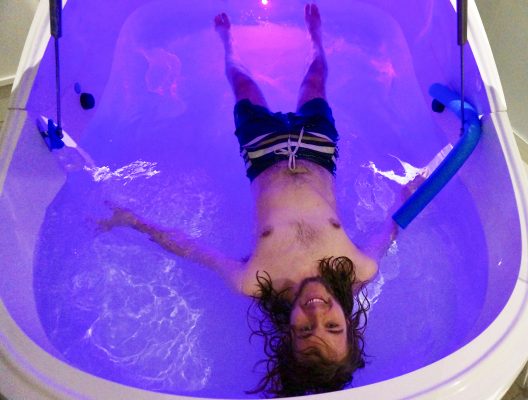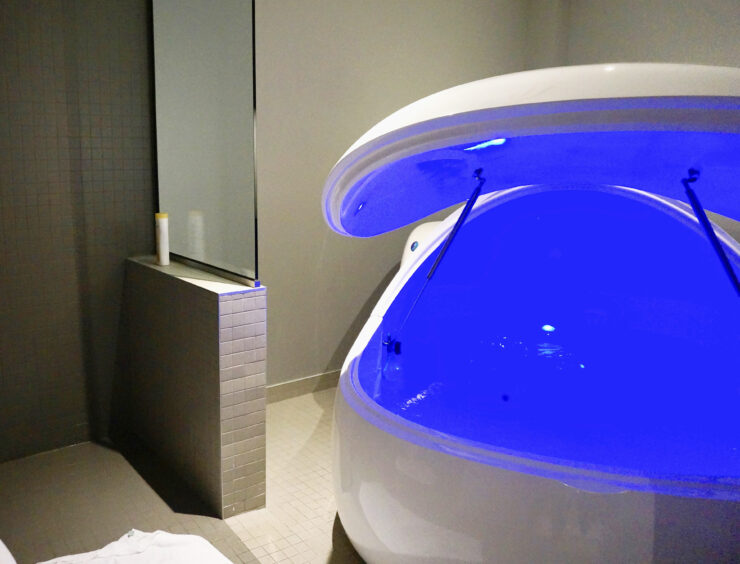Float tanks lower stress, anxiety, chronic pain
A float tank might just be a student’s best friend.
Sensory deprivation tanks, commonly referred to as float tanks, are pods filled with warm salt water, that is buoyant enough for a person to float in. Enclosed from any external noise or light, they are an excellent meditation aid, and in addition have proven health benefits.
Jasson Grant opened ISÖ Spa on Bank St. with Mika Husband two years ago. Since then, the four-pod business has become popular with athletes, mindfulness practitioners, and anyone who is stressed, sore, or tired.
So, it’s great for students.
According to Grant, the pair opened the business to fill in a gap. Before they decided to start their company, the only place to float in the city was a salt-water cavern owned by Nordik Spa. Husband had come from Calgary—where float tanks are popular—and one day wanted to go for a float.
“We Googled it, there was nothing here, and we decided by the end of that lunch that we should open one in Ottawa, and nine months later we were open,” Grant said.

Float tank pods are an interesting bit of engineering. The sleek pods hold a thousand litres of body-temperature water and 1,200 pounds of Epsom salt, allowing anyone to float.
All the pods are also easy to open, can be kept open, and have lights on the inside if you’re nervous about being enclosed in a pitch-black pod. However, Grant recommends closing the pod and turning off the lights for a full meditative experience.
“40-50 per cent of our clientele come in just to meditate … just to be able to come in and for that hour be completely alone and with your own thoughts,” Grant said. “The nice thing is, once you get in the pod, cause the pod does everything for you … you don’t have to fight the traffic the lights, the people.”
People may be wary of mindfulness and wellness because of the New Age clichés, but ISÖ Spa, and much of the culture surrounding floating, avoids the New Age feel in favour of academic-tested health benefits.
Grant says the tanks can also help chronic pain. Grant cautions that it’s not a miracle cure, but that people can feel zero pain while floating and often feel better for a while afterwards.
“That lack of gravity (in the tank) takes all the pressure off the circulation, off the exoskeleton, off the muscles, so they are able to sit there with no pressure points and helps them, for the time they’re in there, feel no pain,” Grant said.
The sensory deprivation also helps reduce stress or anxiety, and has a calming effect for users. In this way, the float tanks acts as both a massage, reducing physical pain and discomfort, and a form of meditation, helping ease the mind.

The tanks have benefits for students, too. An hour in the float tank can make you feel well-rested, reduce stress, and help with concentration.
Float tanks can also help increase creativity and lower tension and fatigue, which would be helpful for students come essay or exam season.
Float tanks are a growing part of the wellness trend, and Grant sees a lot of people incorporate them into their wellness routines.
“They just use it as another tool for that whole wellness market,” said Grant. “They use this as another tool to find that equilibrium.”
The science for float tanks is scarce, but there are some studies, mostly Scandinavian, that have found scientific evidence for the claims often made by users.
“When I first tried when I was much younger it I just found it frustrating and boring … now I recognize that I have to do the work when I’m in the tank to get whatever benefits I want out of it,” said Raywat Deonandan, an associate professor of epidemiology at the University of Ottawa.
Deonandan explores various forms of complementary medicine as a public health specialist. Floating is one that he tried and has stuck with.
He cautioned that the first time in a tank can be boring and frustrating, especially for people who have not practiced meditation, since it is essentially “forced meditation.” But after several floats, the mindfulness benefits begin to appear.
Most research has found that there are perceived measurable reductions in stress, anxiety, and depression while floating, Deonandan said. Pain reduction is also being explored in the scientific literature, although this is very new. Claims of float tanks unleashing someone’s inner DMT—dimethyltryptamine, a powerful psychedelic—are completely unfounded, said Deonandan.
So, floating might not make you hallucinate or find your inner self, but it can have tangible benefits for people suffering from chronic pain, stress, insomnia, and many other ailments. Maybe it’s time for students to begin finding ways to incorporate a float tank into their regimes. At least around exam time.
ISÖ Spa is located at 464 Bank St. Unit #5.





